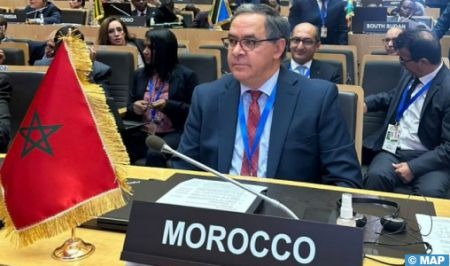Royal Vision Prioritizing Africa’s Noble Causes on Pan-African Agenda Highlighted in AU Executive Council
The constant and far-sighted Royal Vision placing Africa’s noble causes and the vital interests of the African citizen in peace, security and development at the center of the pan-African agenda was put forward on Wednesday before the 44th Ordinary Session of the Executive Council of the African Union (AU) in Addis Ababa. The Kingdom’s approach to joint African action is based on a constant and far-seeing Royal Vision that places Africa’s noble causes and the vital interests of the African citizen in peace, security and development at the center of the pan-African agenda, and consequently attaches South-South cooperation strategic importance in accelerating the goals of Agenda 2063, the Moroccan delegation told the AU Executive Council meeting being held on February 14-15. Indeed, intra-African cooperation is crucial to the continent’s socio-economic, political and cultural development, and offers several key benefits, the delegation stressed, citing economic development, regional integration, strengthening peace and security in Africa, resilience in the face of crises, innovation and knowledge sharing, and strengthening the continent’s voice on the international stage. In terms of economic development, cooperation can boost intra-African trade by reducing tariff and non-tariff barriers, harmonizing regulations and improving transport and communications infrastructures, she added, pointing out that this facilitates access to markets and increases economic opportunities for African countries. Regional integration is an important lever for accelerating economic development, reducing poverty and promoting inclusive growth, the delegation noted, noting that the role of the Regional Economic Communities (RECs) remains vital and of strategic importance. With regard to strengthening peace and security on the continent, the delegation reiterated its full commitment to the cardinal principles of respect for the sovereignty and territorial integrity of States, non-interference in their internal affairs, and good neighborliness. Referring to resilience in the face of crises, the Moroccan delegation noted that, in response to pandemics, climate change or food crises, cooperation enables African countries to share knowledge and strategies to collectively overcome these ever-increasing challenges. In terms of innovation and knowledge sharing, the delegation emphasized that collaboration between African nations encourages the sharing of knowledge, expertise and technologies, thus fostering innovation and the development of solutions tailored to the continent’s specific challenges. Strengthening Africa’s voice on the global stage was highlighted as a collective endeavor to amplify African countries’ representation in international forums and advocate for their interests on various issues. “We are all called upon to make greater efforts to advance intra-African cooperation, which remains the only means that will enable us, as Africans, to take charge and realize the dream of the Africa we want and, in short, meet the expectations and aspirations of our citizens,” the Moroccan delegation affirmed. To enable the pan-African institution to effectively support the development and reform process on the continent, the delegation stressed the imperative of ensuring good administrative and financial governance within the institution, as well as the credibility of the intergovernmental process.

